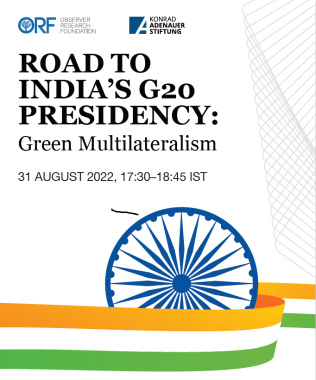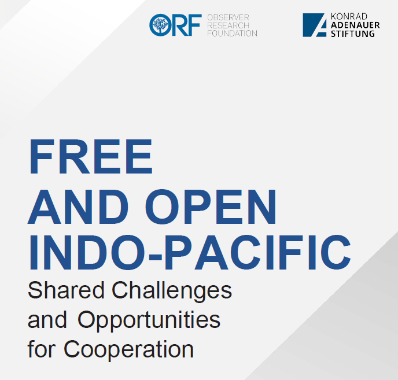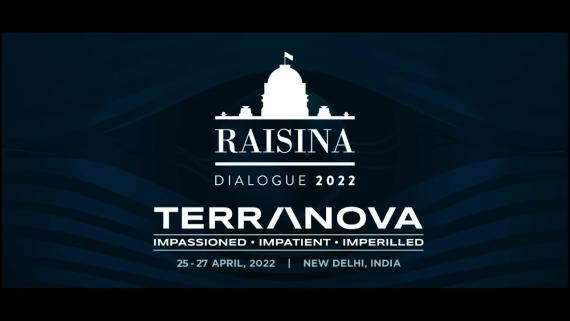Veranstaltungen - Auslandsbüro Indien
Derzeit sind keine Veranstaltungen geplant.
Kongress
European People’s Party 2022 Congress in Rotterdam
The future of Europe in the light of the war in Ukraine
Fachkonferenz
X. “Adenauer-Conference“
Germany’s Role in International Security Affairs
Forum
Raisina Dialogue 2022
Conference Agenda
Live-Stream
Invitation to the Federal Party Conference of the Christian Democratic Union (CDU)
On the 22 January 2022 from 14.30 hrs - 18.00 hrs IST we cordially invite you to attend the federal party conference of the CDU
Live-Stream
Potential for Indo-European/German Cooperation in the Indo-Pacific
ORF, NMF & KAS India Office Virtual Symposium
To mark the arrival of the German Frigate Bayern in Mumbai as a symbol of European and Germany’s pivot towards the Indo-Pacific, the Observer Research Foundation, the National Maritime Foundation and the India Office of the Konrad-Adenauer-Stiftung cordially invite you to this virtual symposium
Event
Tag der Konrad-Adenauer-Stiftung 2021
„Politik und Vertrauen“
Die Arbeit der Konrad-Adenauer-Stiftung im Kontext von Partizipation, Repräsentation, Sicherheit und Innovation
Studien- und Informationsprogramm
A virtual feast of curated events awaits you. For details visit Facebook Page - @kas.newdelhi
"https://www.facebook.com/kas.newdelhi"
We are now on Facebook which means you can follow our activities even more closely and effortlessly. You can either search us with the name (@kas.newdelhi) or you can copy & paste the link below which will take you to our official Facebook page: https://www.facebook.com/kas.newdelhi If you have any problems finding us then you can also write to us on our official mailbox i.e. Info.India@kas.de and we will guide you to our Facebook page.
Workshop
Plural Ideas of Justice: Stories, Narratives and Experiences from India
- Justice Adda and KAS India Office
Justice Adda in partnership with the India Office of Konrad-Adenauer-Stiftung is organizing an online workshop on Plural Ideas of Justice: Stories, Narratives and Experiences from India. The workshop will take place on 23rd and 24th April 2021 online.
Online-Seminar
Blue Economy Series -"Blue Economy-India’s’ Pathway to a Sustainable, Secure and Resilient Economy"
- A quadrilateral project by FICCI, Konrad Adenauer Stiftung (KAS), TERI and NMF
The webcast – third in the series - is part of a chain of Diginars being organised in a thought-leadership Quadrilateral project by FICCI, Konrad Adenauer Stiftung (KAS), TERI and NMF titled "Blue Economy-India’s’ Pathway to a Sustainable, Secure and Resilient Economy". As part of the series, six webcasts and a National Conference will be conducted from 2020-2021.
Online-Seminar
ICS - KAS Webcast on Future of India-China Economic Relations: Towards De-Coupling, Reduced Dependency, or a New Equilibrium?
Institute of Chinese Studies & the India Office of the Konrad-Adenauer-Stiftung (KAS) is organizing an interactive webinar on the topic "Future of India-China Economic Relations: Towards De-Coupling, Reduced Dependency, or a New Equilibrium?" on Wednesday, 12th August 2020 at 15:00 Hrs on Zoom Platform












